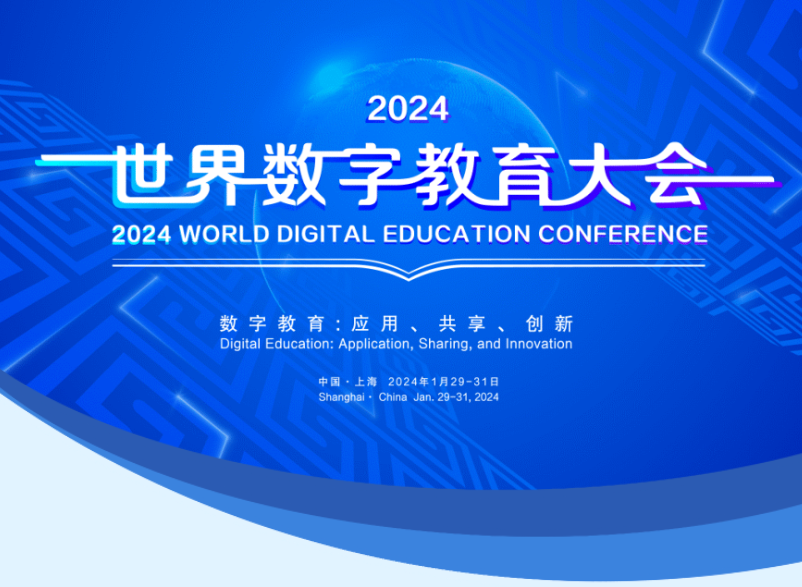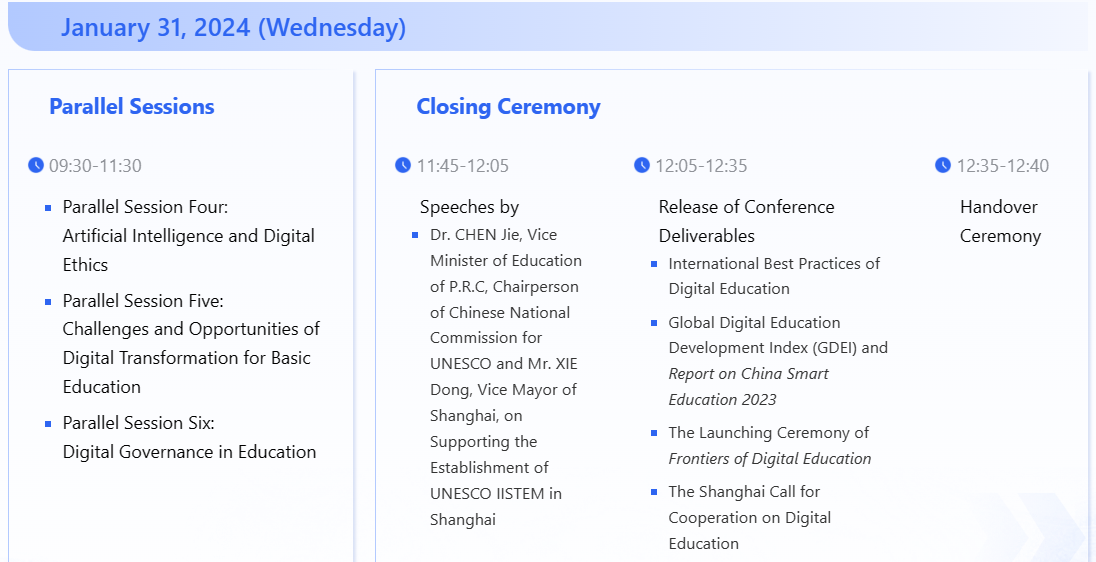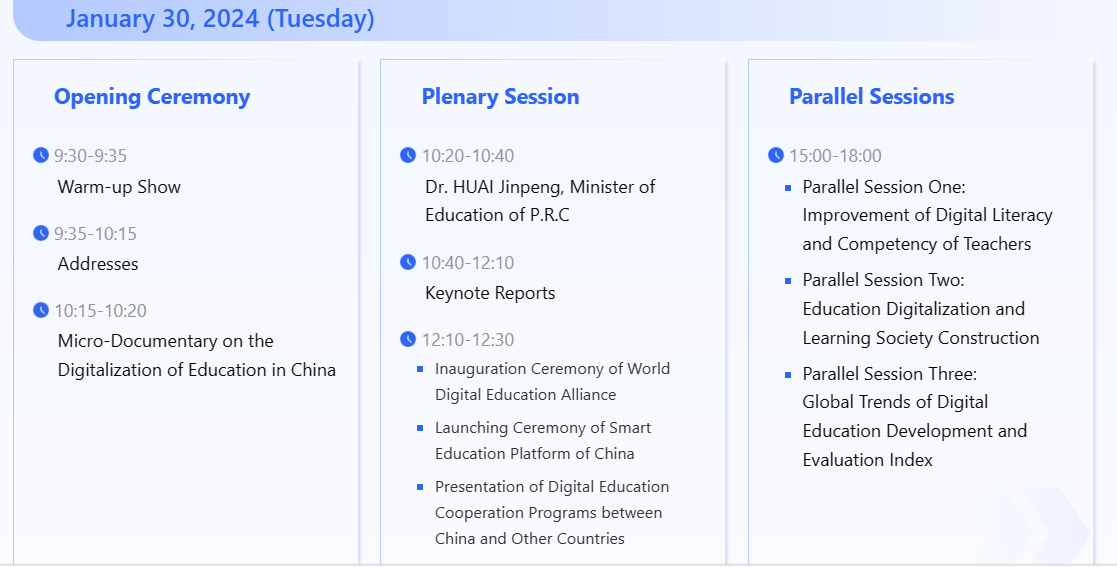 Background
Background
The 2024 World Digital Education Conference (WDEC) will be held in Shanghai, China on 29-31 January 2024, co-hosted by the Ministry of Education of the People’s Republic of China, the Chinese National Commission for UNESCO and Shanghai Municipal People’s Government.

As a new round of scientific and technological revolution and industrial revolution accelerates, digital technology has increasingly become a driving force that fundamentally changes and reshapes the thinking patterns, organizational structures, and operational modes of human society in all fronts. It presents us with both new challenges and major opportunities to innovate pathways, redesign forms and promote development. The application and development of digital technology have integrated into all areas of society and will exert a profound influence on the future development of education.
The United Nations, along with countries worldwide and numerous international organizations, are taking active measures to prioritize digital education as a crucial pathway and initiative in responding to challenges and forging a bright future. Digital transformation has become a vital vehicle and direction for global educational transformation. The United Nations Transforming Education Summit has identified digital transformation in education as one of the five priority areas for action, emphasizing that the digital revolution should ensure benefits for all learners. Many countries have implemented strategies for digital development with education being a significant component of these efforts.
In this context, the Ministry of Education of the People’s Republic of China and the Chinese National Commission for UNESCO successfully co-hosted the 2023 World Digital Education Conference in Beijing, China in February 2023. Representatives from over 130 countries and regions shared their latest policies and effective practices on digital education transformation, and received favorable responses and reviews from all parties involved.
Objectives and Theme
The conference aims to work with governments, universities, primary and secondary schools, enterprises, and other stakeholders, relevant international organizations and non-governmental organizations to jointly explore practices and innovations in digital education. It seeks to promote inclusive, equitable, and quality education through digital education transformation, thereby advancing the realization of the United Nations Sustainable Development Goals.
With the theme of “Digital Education: Application, Sharing, and Innovation”, the conference will focus on topics including Improvement of Digital Literacy and Competency of Teachers, Education Digitalization and Learning Society Construction, Global Trends of Digital Education Development and Evaluation Index, Artificial Intelligence and Digital Ethics, Challenges and Opportunities of Digital Transformation for Basic Education, and Digital Governance in Education.
Participants
Participants The following representatives were invited to attend the conference, including:
- State leaders and education ministers from relevant countries
- Diplomatic envoys stationed in China from relevant countries
- Heads and representatives of UN agencies
- Heads and representatives of relevant international organizations and non-governmental organizations
- Presidents and professors from universities
- Principals and teachers from primary and secondary schools
- Representatives of digital technology experts and scholars and representatives of companies
Agenda


Parallel Sessions
Improvement of Digital Literacy and Competency of Teachers
The parallel session Improvement of Digital Literacy and Competency of Teachers, is hosted by East China Normal University with the guidance of the Department of Teacher Education of the Chinese Ministry of Education. This session aims to facilitate the sharing of cutting-edge concepts and exemplary practices worldwide in regard to improving teachers’ digital literacy and competency. It serves as a platform for exchanging effective strategies and showcasing successful experiences in this field, with the ultimate goal of promoting global efforts to improve teachers’ digital literacy and competency and empowering them as key agents of educational transformation. The session consists of the opening ceremony, keynote speeches, and a round-table discussion. High-level officials from domestic and international education departments will deliver speeches during the opening ceremony. Ten experts including scholars from higher education institutions, representatives from local education departments, and leaders of international organizations will share innovative ideas and exchange experiences in their keynote speeches, which will be centered around topics such as establishing standards and evaluations for teachers’ digital literacy, pathways for enhancing digital literacy and competence, and creating an enabling environment for fostering digital literacy. The round-table discussion will focus on pragmatic approaches to enhancing teachers’ digital literacy and competence. This session warmly welcomes esteemed individuals, including representatives from domestic and international universities, principals and teachers from primary and secondary schools, experts and scholars specializing in digital technology, as well as officials responsible for promoting the enhancement of teachers’ digital literacy in local education departments.
Education Digitalization and Learning Society Construction
The parallel session Digitalization and the Building of a Learning Society focuses on two significant trends: digitalization of education and the building of a learning society. It aims to comprehensively explore the major theoretical and practical aspects of empowering a learning society through digitalization from diverse perspectives and multiple levels. Key topics include digital empowerment in the development of a learning city, the digitalization of continuing education and vocational education, the acceleration of elderly education through smart elderly care, and the promotion of lifelong learning and the construction of a learning society. The session seeks to accomplish the following objectives: sharing the latest policies, strategies, and practices in digitalization and the construction of a learning society both domestically and internationally in order to facilitate the exchange of experiences and mutual learning; showcasing cutting-edge research outcomes, encouraging interdisciplinary and cross-sector collaboration, and promoting knowledge innovation; exploring the application of emerging technologies such as artificial intelligence, big data, and virtual reality in the construction of a learning society and uncovering the transformative potential of technology in continuing education and vocational education; strengthening international cooperation in talent development within this field, and enhancing the professional competence and capabilities of educators in this domain. With the guidance of the Department of Vocational and Adult Education of the Chinese Ministry of Education, the session is hosted by the Open University of China and Shanghai Open University, and co-organized by the Center for Vocational Education Development of the Ministry of Education, East China Normal University, and the China Adult Education Association. Esteemed participants will be invited to attend the session, including representatives from international organizations and diplomatic envoys in China, officials from domestic and foreign education departments, representatives from global learning cities, leaders of higher education, vocational education, and adult education associations, delegates from universities, research institutions, industry enterprises, experts and scholars, as well as representatives from the media.
Global Trends of Digital Education Development and Evaluation Index
The parallel session Global Trends of Digital Education Development and Evaluation Index, with the primary objective of facilitating the exchange of ideas regarding global trends in digital education development, aims to share experiences and insights from both domestic and international perspectives on the monitoring and evaluation of digital education. Furthermore, it seeks to explore theoretical frameworks, practical methodologies, and exemplary applications in digital education assessment, ultimately achieving a global collaborative consensus in this field. With the guidance of Committee of Experts on Education Digitalization of the Ministry of Education, the session is hosted by the China National Academy of Education Sciences, with Shanghai Municipal Education Commission and Shanghai Normal University acting as supporting institutions. Participants invited to the session include experts in the field of digital education assessment from universities and research institutions, officials responsible for digital education within education authorities, representatives from exemplary schools in the development of digital education, as well as delegates from relevant international organizations.
Artificial Intelligence and Digital Ethics
The parallel session Artificial Intelligence and Digital Ethics centers around the theme of Enrichment of Education through Artificial Intelligence. Hosted by the China Association of Higher Education and organized by Tongji University with the guidance of the Department of Science, Technology and Informatization of Chinese Ministry of Education, this session aims to share valuable experiences and best practices of various countries in the promotion of the application of artificial intelligence technology in education and to achieve consensus on the ethical boundaries of digital technology implementation in education. The session consists of opening addresses, keynote speeches, case exchanges, and round-table discussions, featuring distinguished speakers such as leaders of international organizations, officials from domestic and foreign education departments, university presidents, renowned experts, and corporate representatives.
Challenges and Opportunities of Digital Transformation for Basic Education
The parallel session Challenges and Opportunities of Digital Transformation for Basic Education will focus on three key areas for discussion and exploration, namely utilizing digitalization to enhance the quality of basic education, facilitating equitable access to high-quality resources through digital sharing, and adapting educational models to meet the future societal demands for talent through digital transformation. The session is organized with the guidance of the Department of Basic Education of the Chinese Ministry of Education, with the Shanghai Municipal Education Commission and the China Education Association for International Exchange serving as the hosts. Supporting institutions include Shanghai Normal University, International Education Association Shanghai, and China Education Publishing & Media Group Ltd. Officials from domestic and international education departments, principals of primary and secondary schools, representatives from relevant domestic and international organizations or their institutions in China, as well as esteemed international experts, scholars, and researchers on digitalization will be invited to attend this session.
Digital Governance in Education
The parallel session Digital Governance and Digital Transformation of Education aims to provide a platform for countries to exchange and share practical experiences and innovative initiatives in the realm of digital governance and digital transformation of education. The session intends to strengthen the participation and collaborative efforts of local governments, enterprises, schools, and other relevant stakeholders. Furthermore, it seeks to explore strategies for enhancing international cooperation to address key issues and challenges related to digital education governance. The advising board of this session is the Secretariat of National Commission of the People’s Republic of China for UNESCO. It is jointly hosted by the Shanghai Municipal Education Commission and the UNESCO Institute for Information Technologies in Education, with the UNESCO Teacher Education Center serving as the organizer. The program will feature keynote presentations by esteemed domestic and international experts on themes such as “Practice and Innovation: Exchanging Experiences in Digital Education Governance”, “Participation and Action: Engaging Diverse Stakeholders to Drive Digitalization of Education Governance and Digital Education Governance”, and “Issues and Challenges: Key Aspects of the Digitalization of Education Governance and Digital Education Governance”. Officials from domestic and international education departments, representatives from international organizations, delegates from universities and research institutions, as well as corporate representatives will be invited to attend this session.
The Digital and Smart Education Future Exhibition
President Xi Jinping has emphasized that digital education is where our country can achieve breakthroughs in opening up new areas and forming fresh strengths of educational development. In recent years, the Ministry of Education has been implementing the National Strategic Action Plan for Digital Education, guided by the “3C” concept of connection, content, and cooperation. Based on the principles of application, service, precision, efficiency and security, we have successfully established the largest library of education and teaching resources in the world, which empowers digital technology to elevate, enrich, and enhance the high-quality development of education. China’s achievements in digital education have been highly recognized by the international community, and our experience and approaches in this field are being shared with the world.
Looking ahead, China’s digital education, focusing on application and governance, will strive to be more integrated, intelligent and international, thus making more remarkable contributions to building a community with a shared future for humanity. The Exhibition on the Future of Digital and Smart Education will feature four main chapters: the journey of informatization, digital transformation, intelligent development, and digital education equipment.
Reprinted by OUC from the WDEC Official Website https://wdec.smartedu.cn/en/#aboutForum